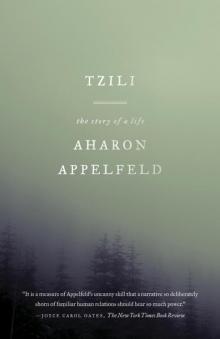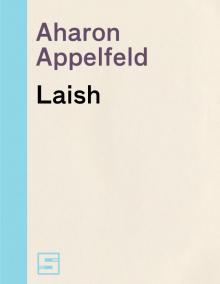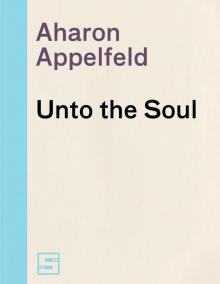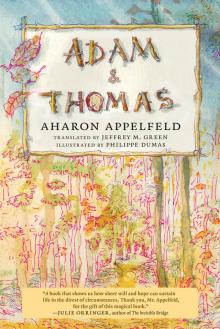- Home
- Aharon Appelfeld
Tzili
Tzili Read online
This is a work of fiction. Names, characters, places, and incidents either are the product of the author’s imagination or are used fictitiously. Any resemblance to actual persons, living or dead, events, or locales is entirely coincidental.
Copyright © 1983 by Aharon Appelfeld
All rights reserved. Published in the United States by Schocken Books, a division of Random House, Inc., New York, and in Canada by Random House of Canada Limited, Toronto. Originally published in Hebrew in Israel as Ha’Kutonet Vi’Ha’Pasim by Hakibbutz Hameuchad Publishing House, Ltd., Tel Aviv, in 1983. This translation was originally published in hardcover in the United States by E. P. Dutton, Inc., New York, in 1983.
Schocken Books and colophon are
registered trademarks of Random House, Inc.
Library of Congress Cataloging-in-Publication Data
Appelfeld, Aron.
[Kutonet veha-pasim. English]
Tzili : the story of a life / Aharon Appelfeld.
p. cm.
eISBN: 978-0-8052-1253-2
1. Holocaust, Jewish (1939–1945)—Fiction. I. Title.
PJ5054.A755K813 2012 892.4’36—dc23 2011050301
www.schocken.com
Cover photograph by Alexander Kenney Photography/Flicker/Getty Images
Cover design by Linda Huang
v3.1
Contents
Cover
Title Page
Copyright
Chapter 1
Chapter 2
Chapter 3
Chapter 4
Chapter 5
Chapter 6
Chapter 7
Chapter 8
Chapter 9
Chapter 10
Chapter 11
Chapter 12
Chapter 13
Chapter 14
Chapter 15
Chapter 16
Chapter 17
Chapter 18
Chapter 19
Chapter 20
Chapter 21
Chapter 22
Chapter 23
Chapter 24
Chapter 25
Chapter 26
Chapter 27
Chapter 28
Chapter 29
Chapter 30
Chapter 31
Chapter 32
Chapter 33
Chapter 34
About the Author
Other Books by This Author
1
PERHAPS IT WOULD BE better to leave the story of Tzili Kraus’s life untold. Her fate was a cruel and inglorious one, and but for the fact that it actually happened we would never have been able to tell her story. We will tell it in all simplicity, and begin right away by saying: Tzili was not an only child; she had older brothers and sisters. The family was large, poor, and harassed, and Tzili grew up neglected among the abandoned objects in the yard.
Her father was an invalid and her mother busy all day long in their little shop. In the evening, sometimes without even thinking, one of her brothers or sisters would pick her out of the dirt and take her into the house. She was a quiet creature, devoid of charm and almost mute. Tzili would get up early in the morning and go to bed at night like a squirrel, without complaints or tears.
And thus she grew. Most of the summer and autumn she spent out of doors. In winter she snuggled into her pillows. Since she was small and skinny and didn’t get in anyone’s way, they ignored her existence. Every now and then her mother would remember her and cry: “Tzili, where are you?” “Here.” The answer would not be long in coming, and the mother’s sudden panic would pass.
When she was seven years old they sewed her a satchel, bought her two copybooks, and sent her to school. It was a country school, built of gray stone and covered with a tiled roof. In this building she studied for five years. Unlike other members of her race, Tzili did not shine at school. She was clumsy and somewhat withdrawn. The big letters on the blackboard made her head spin. At the end of the first term there was no longer any doubt: Tzili was dull-witted. The mother was busy and harassed but she gave vent to her anger nevertheless: “You must work harder. Why don’t you work harder?” The sick father, hearing the mother’s threats, sighed in his bed: What was to become of them?
Tzili would learn things by heart and immediately forget them again. Even the gentile children knew more than she did. She would get mixed up. A Jewish girl without any brains! They delighted in her misfortune. Tzili would promise herself not to get mixed up, but the moment she stood in front of the blackboard the words vanished and her hands froze.
For hours she sat and studied. But all her efforts didn’t help her. In the fourth grade she still hadn’t mastered the multiplication table and her handwriting was vague and confused. Sometimes her mother lost her temper and hit her. The sick father was no gentler than the mother. He would call her and ask: “Why don’t you study?”
“I do study.”
“Why don’t you know anything?”
Tzili would hang her head.
“Why are you bringing this disgrace on your family?” He would grind his teeth.
The father’s illness was fatal, but the dull presence of his youngest daughter hurt him more than his wound. Again and again he blamed her laziness, her unwillingness, but never her inability. “If you want to you can.” This wasn’t a judgment, but a faith. In this faith they were all united, the mother in the shop and her daughters at their books.
Tzili’s brothers and sisters all worked with a will. They prepared for external examinations, registered for crash courses, devoured supplementary material. Tzili cooked, washed dishes, and weeded the garden. She was small and thin, and kneeling in the garden she looked like a servant girl.
But all her hard work did not save her from her disgrace. Again and again: “Why don’t you know anything? Even the gentile children know more than you do.” The riddle of Tzili’s failure tortured everyone, but especially the mother. From time to time a deep groan burst from her chest, as if she were mourning a premature death.
In the winter evil rumors were already rife, but only echoes reached the remoter districts. The Kraus family labored like ants. They hoarded food, the daughters memorized dates, the younger son drew clumsy geometric figures on long sheets of paper. The examinations were imminent, and they cast their shadow over everyone. Heavy sighs emerged from the father’s darkened room: “Study, children, study. Don’t be lazy.” The vestiges of a liturgical chant in his voice aroused his daughters’ ire.
At home Tzili was sometimes forgotten, but at school, among all the gentile children, she was the butt of constant ridicule and scorn. Strange: she never cried or begged for mercy. Every day she went to her torture chamber and swallowed the dose of insults meted out to her.
Once a week a tutor came from the village to teach her her prayers. The family no longer observed the rituals of the Jewish religion, but her mother for some reason got it into her head that religious study would be good for Tzili, besides putting a little money the old man’s way. The tutor came on different days of the week, in the afternoons. He never raised his voice to Tzili. For the first hour he would tell her stories from the Bible and for the second he would read the prayer book with her.
At the end of the lesson she would make him a cup of tea. “How is the child progressing?” the mother would ask every now and then. “She’s a good girl,” the old man would say. He knew that the family did not keep the Sabbath or pray, and he wondered why it had fallen to the lot of this dull child to keep the spark alive. Tzili did her best to please the old man, but as far as reading was concerned her progress left much to be desired. Among her brothers and sisters the old man’s visits gave rise to indignation. He wore a white coat and shabby shoes, and his eyes glinted with the skepticism of a man whose scholarship had not h
elped him in his hour of need. His sons had emigrated to America, and he was left alone in the derelict old house. He knew that he was nothing but a lackey in the service of Tzili’s family’s hysteria, and that her brothers and sisters could not bear his presence in the house. He swallowed his humiliation quietly, but not without disgust.
At the end of the reading in the prayer book he would ask Tzili, in the traditional, unvarying formula:
“What is man?”
And Tzili would reply: “Dust and ashes.”
“And before whom is he destined to stand in judgment?”
“Before the King of Kings, the Holy One blessed be He.”
“And what must he do?”
“Pray and observe the commandments of the Torah.”
“And where are the commandments of the Torah written?”
“In the Torah.”
This set formula, spoken in a kind of lilt, would awaken loud echoes in Tzili’s soul, and their reverberations spread throughout her body. Strange: Tzili was not afraid of the old man. His visits filled her with a kind of serenity which remained with her and protected her for many hours afterward. At night she would recite “Hear, O Israel” aloud, as he had instructed her, covering her face.
And thus she grew. But for the old man’s visits her life would have been even more wretched. She learned to take up as little space as possible. She even went to the lavatory in secret, so as not to draw attention to herself. The old man, to tell the truth, felt no affection for her. From time to time he grew impatient and scolded her, but she liked listening to his voice and imagined that she heard tenderness in it.
2
WHEN THE WAR broke out they all ran away, leaving Tzili to look after the house. They thought nobody would harm a feeble-minded little girl, and until the storm had spent itself, she could take care of their property for them. Tzili heard their verdict without protest. They left in a panic, without time for second thoughts. “We’ll come back for you later,” said her brothers as they lifted their father onto the stretcher. And thus they parted from her.
That same night the soldiers invaded the town and destroyed it. A terrible wailing rose into the air. But Tzili, for some reason, escaped unharmed. Perhaps they didn’t see her. She lay in the yard, among the barrels in the shed, covered with sacking. She knew that she had to look after the house, but her fear stopped her from doing so. Secretly she hoped for the sound of a familiar voice coming to call her. The air was full of loud screams, barks, and shots. In her fear she repeated the words she had been taught by the old man, over and over again. The mumbled words calmed her and she fell asleep.
She slept for a long time. When she woke it was night and everything was completely still. She poked her head out of the sacking, and the night sky appeared through the cracks in the roof of the shed. She lifted the upper half of her body, propping herself up on her elbows. Her feet were numb with cold. She passed both hands over the round columns of her legs and rubbed them. A pain shot through her feet.
For a long time she lay supporting herself on her elbows, looking at the sky. And while she lay listening, her lips parted and mumbled:
“Before whom is he destined to stand in judgment?”
“Before the King of Kings, the Holy One blessed be He.”
The old man had insisted on the proper pronunciation of the words, and it was this insistence she remembered now.
But in the meantime the numbness left her legs, and she kicked away the sacking. She said to herself: I must get up, and she stood up. The shed was much higher than she was. It was made of rough planks and used to store wood, barrels, an old bathtub, and a few earthenware pots. No one but Tzili paid any attention to this old shed, but for her it was a hiding place. Now she felt a kind of intimacy with the abandoned objects lying in it.
For the first time she found herself under the open night sky. When she was a baby they would close the shutters very early, and later on, when she grew up, they never let her go outside in the dark. For the first time she touched the darkness with her fingers.
She turned right, into the open fields. The sky suddenly grew taller, and she was small next to the standing corn. For a long time she walked without turning her head. Afterward she stopped and listened to the rustle of the leaves. A light breeze blew and the cool darkness assuaged her thirst a little.
On either side stretched crowded cornfields, one plot next to the other, with here and there a fence. Once or twice she stumbled and fell but she immediately rose to her feet again. In the end she hitched her dress up and tucked it into her belt, and this immediately liberated her legs. From now on she walked easily.
For some reason she began to run. A memory invaded her and frightened her. The memory was so dim that after she ran a little way it disappeared. She resumed her previous pace.
Her oldest sister, who was preparing for examinations, was the worst of them all. When she was swotting, she would chase Tzili away without even lifting her head from her books. Tzili loved her sister and the harsh words hurt her. Once her sister had said: “Get out of my sight. I never want to see you again. You make me nervous.” Strange: these words rather than any others were the ones that seemed to carve themselves out of the darkness.
The darkness seeped slowly away. A few pale stripes appeared in the sky and turned a deeper pink. Tzili bent over to rub her feet and sat down. Unthinkingly she sank her teeth into a cornstalk. A stream of cool liquid washed her throat.
The light broke above her and poured onto her head. A few solitary animal cries drifted through the valley and a loud chorus of barks immediately rose to join them. She sat and listened. The distant sounds cradled her. Without thinking she fell asleep.
The sun warmed her body and she slept for many hours. When she woke she was bathed in sweat. She picked up her dress and shook off the grains of sand sticking to her skin. The sun caressed her limbs and for the first time she felt the sweet pain of being alone.
And while everything was still quiet and wrapped in shadows a shot pierced the air, followed by a sharp, interrupted scream. She bent down and covered her face. For a long time she did not lift her head. Now it seemed to her that something had happened to her body, in the region of the chest, but it was only a vague, hollow numbness after a day without eating.
The sun sank and Tzili saw her father lying on his bed. The last days at home, the rumors and the panic. Books and copybooks. No one showed any consideration for the feelings of his fellows. The examinations, which were to take place shortly in the distant town, threatened them all, especially her oldest sister. She tore out her hair in despair. Their mother too, in the shop, between one customer and the next, appeared to be repeating dates and formulas to herself. The truth was that she was angry. Only the sick father lay calmly in his bed. As if he had succeeded in steering the household onto the right course. He seemed to have forgotten his illness, perhaps even the dull presence of his youngest daughter. What he had failed to accomplish in his own life his children would accomplish for him: they would study. They would bring diplomas home.
And with these sights before her eyes she fell asleep.
3
WHEN SHE WOKE, her memory was empty and weightless. She rose and left the cornfield and made for the outskirts of the forest. As if to spite her, another picture rose before her eyes, it too from the last days at home. Her youngest brother was adamant: he had to have a bicycle—all his friends, even the poorest, had bicycles. All his mother’s pleas were in vain. She had no money. And what she had was not enough. Their father needed medicines. Tzili’s seventeen-year-old brother shouted so loudly in the shop that strangers came in to quiet him. The mother wept with rage. And the older sister, who did not leave her books for a moment, shrieked: because of her family she would fail her exams. Tzili now remembered with great clarity her sister’s white hand waving despairingly, as if she were drowning.
The day passed slowly, and visions of food no longer troubled her. She saw what was before her eyes: a t
hin forest and the golden calm of summer. All she had endured in the past days lost its terror. She was borne forward unthinkingly on a stream of light. Even when she washed her face in the river she felt no strangeness. As if it had always been her habit to do so.
And while she was standing there a rustle went through the field. At first she thought it was the rustle of the leaves, but she immediately realized her mistake: her nose picked up the scent of a man. Before she had time to recover she saw, right next to her, a man sitting on a little hillock.
“Who’s there?” said the man, without raising his voice.
“Me,” said Tzili, her usual reply to this question.
“Who do you belong to?” he asked, in the village way.
When she did not answer right away, the man raised his head and added: “What are you doing here?”
When she saw that the man was blind, she relaxed and said: “I came to see if the corn was ready for the harvesting.” She had often heard these words spoken in the shop. Since the same sentence, with slight variations, was repeated every season, it had become part of her memory.
“The corn came up nicely this year,” said the blind man, stroking his jacket. “Am I mistaken?”
“No father, you’re not mistaken.”
“How high is it?”
“As high as a man, or even higher.”
“The rains were plentiful,” said the blind man, and licked his lips.
His blind face went blank and he fell silent.
“What time is it?”
“Noon, father.”
He was wearing a coarse linen jacket and he was barefoot. He sat at his ease. The years of labor were evident in his sturdy shoulders. Now he was looking for a word to say, but the word evaded him. He licked his lips.
“You’re Maria’s daughter, aren’t you?” he said and chuckled.
“Yes,” said Tzili, lowering her voice.
“So we’re not strangers.”
Maria’s name was a household word throughout the district. She had many daughters, all bastards. Because they were all good-looking, like their mother, nobody harmed them. Young and old alike availed themselves of their favors. Even the Jews who came for the summer holidays. In Tzili’s house Maria’s name was never spoken directly.

 Long Summer Nights
Long Summer Nights Tzili
Tzili The Conversion
The Conversion The Iron Tracks
The Iron Tracks All Whom I Have Loved
All Whom I Have Loved Laish
Laish The Retreat
The Retreat Unto the Soul
Unto the Soul Blooms of Darkness
Blooms of Darkness The Man Who Never Stopped Sleeping
The Man Who Never Stopped Sleeping Katerina
Katerina Until the Dawn's Light
Until the Dawn's Light Adam and Thomas
Adam and Thomas Suddenly, Love
Suddenly, Love